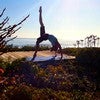Post Trauma
Christi Idavoy
Tutorial 2981
Watch this Tutorial


Christi Idavoy
It is key to surround ourselves, as professionals, with others that have more experience than we do so that we can keep a clear perspective of what our scope is and to have mentors we can receive guidance from to keep growing. I think what is portrayed here is much more profound than 'creating a nice space', but rather shows active listening, which is in itself healing, and is what would allow an instructor to even realize if they are within the bounds of their scope of practice. Its great to hear you're a Polestar grad ... And as you know, at Polestar we do teach instructors the contraindications for common pathologies, which all include trauma. Perhaps we have to further clarify the meaning of trauma and the assumptions that this video is not in any way to substitute medical attention, but again, offers a different perspective for instructors when communicating with others. Thank you again for enriching the conversation Jason !
8 years ago
Hi Kristi, thank you for introducing the idea of trauma therapy into Pilates. I do think it could work well for trauma if people had a bit more trauma therapy. I'm don't mean to sound too critical, but I honestly believe PA needs a few more critics on it. The reviews are always all kindness and compliments, as if everything done here is perfect, and that doesn't make for a growing environment. We need to encourage each other, but we need to point out what could be improved also. I don't really see that happening on PA.
Active listening is healing, but it is not (this is not my opinion. It is that of Peter Levine, Pat Ogden, Bessel Van Der Kolk etc etc) trauma therapy. And, when people who are really traumatized are encouraged to talk too much, they can be re-traumatized. Again, this is not my opinion, it is that of pros in the field.
Active listening is healing, but it is not (this is not my opinion. It is that of Peter Levine, Pat Ogden, Bessel Van Der Kolk etc etc) trauma therapy. And, when people who are really traumatized are encouraged to talk too much, they can be re-traumatized. Again, this is not my opinion, it is that of pros in the field.
8 years ago
In any case, I think it is really important to first thing refer out with traumatized people. That doesn't mean they can't come back, but the treatment plan should be made with a doctor. Trauma is not in the scope of practice for Pilates teachers. There is no study of it in the PS curriculum.
I really appreciate your passion for Pilates and attitude of always wanting to grow and learn. You are a good inspiration!
Jason
I really appreciate your passion for Pilates and attitude of always wanting to grow and learn. You are a good inspiration!
Jason
8 years ago
Jason, all of your points are well taken. Thank you. I wonder if we were to take the word "Trauma" out of the title and description you would feel differently about this video? Our intention was to address people like me (6 months post concussion full of fear of moving after 30 years of teaching movement to others) who needs reassurance that someone will see us, as we are now, despite what we might have been prior to an accident, injury, or major change in life. We should have told you that we aren't attempting to prescribe specific trauma protocol (we will tell others now that we have your feedback) Continued...
8 years ago
Jason ...We should have told you that I am in the care of Dr's. and therapists. I've had CranioSacral, IMT, Chiropractic, Acupuncture, and 30 hyperbaric chamber dives (at least), prior to wanting to share this video. The Doctors say there is nothing wrong with me. I have no medical restrictions and pump myself full of supplements daily. I'm still looking to feel better, yet I was afraid to get a lesson from another. I doubt I am alone. Christi's approach was simple. She wasn't dealing with my trauma, she was dealing with me.
8 years ago
Jason, I appreciate your comments on criticism very much too. If I've learned anything through the situation I am personally in, it is that nothing is perfect, I am open to receiving help, and when someone is willing to do that, in whatever form, I am always grateful. Thank you so much.
8 years ago
Wow... this whole conversation is great. Thanks to Kristi and Christi for your honesty and transparency and Jason for bringing up some interesting points as well.
Some thoughts- In finishing my research project for Lolita San Miguels Master Mentor Program my topic is Trauma, PTSD and Pilates: Using Contrology as a Pathway to understanding Trauma and I resonate with all perspectives here.
Yes- pilates (mind/body movement) is obviously not usually the only Protocal necessary and addressing trauma however Jason you mentioned Peter Levine. Levine (Waking the Tiger, amongst other titles ) discusses the importance of the "felt sense" which awakens our embodied self and in addressing healing from the body's perspective (somatic experiencing).-
Some thoughts- In finishing my research project for Lolita San Miguels Master Mentor Program my topic is Trauma, PTSD and Pilates: Using Contrology as a Pathway to understanding Trauma and I resonate with all perspectives here.
Yes- pilates (mind/body movement) is obviously not usually the only Protocal necessary and addressing trauma however Jason you mentioned Peter Levine. Levine (Waking the Tiger, amongst other titles ) discusses the importance of the "felt sense" which awakens our embodied self and in addressing healing from the body's perspective (somatic experiencing).-
8 years ago
I'm new to studying his research this year and in no way am I a psychological representative but he and Robert Scaer (The Body bears the Burden) specifically, along with Bessel Van Der Kolk, discuss the importance of approaching trauma from the perspective of the body- and as the body is what holds the trauma in active memory and as dissociation is one of the main criteria of trauma the key point of the Pilates principle of Awareness is critical in terms of slowly encouraging a re-engagement of the felt sense - of feeling empowered to create new changes internally and externally.
I could go on and on.... but to be succinct I believe the 6 principles of Pilates, although not the only part/way to healing trauma, are a beautiful tool in the overall recipe of addressing the physiological and autonomic processes that happen when the body is hijacked though a fixed state of perceived life threatening helplessness (which is what really defines trauma).
I could go on and on.... but to be succinct I believe the 6 principles of Pilates, although not the only part/way to healing trauma, are a beautiful tool in the overall recipe of addressing the physiological and autonomic processes that happen when the body is hijacked though a fixed state of perceived life threatening helplessness (which is what really defines trauma).
8 years ago
21-30 of 44
You need to be a subscriber to post a comment.
Please Log In or Create an Account to start your free trial.






















